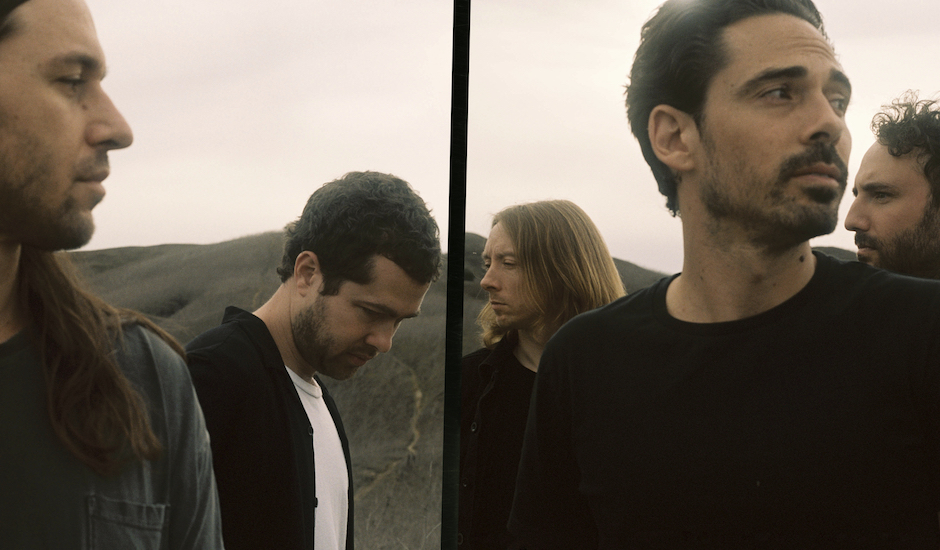 Inside SOFI TUKKER's next chapter: "We're evolved and excited for what's next."After dominating dance music for much of the last three years, SOFI TUKKER look at their next era.
Inside SOFI TUKKER's next chapter: "We're evolved and excited for what's next."After dominating dance music for much of the last three years, SOFI TUKKER look at their next era.

In 2019, Local Natives are reinventing themselves
The Californian indie-rock ensemble will be in the country for Splendour In The Grass and sideshows this July.
Header image by Drew Escriva.
Local Natives, basking in the afterglow of the release of their fourth studio album Violet Street, are happy to be back where they started. It’s been almost a decade since their stellar 2010 debut album Gorilla Manor saw them catapult deep into the hearts of indie-aficionados across the globe, and their collective passion has never faded. It all started in the way most bands start out, living in one big share house, working, resting and existing within a creative whirlwind. The Orange County palace – aptly referred to as Gorilla Manor – housed all five members and an assortment of instruments, from guitars aplenty to a thrift store piano. Such a casual, liberating environment encouraged the Californian group to work directly from the source of their sound, nailing exactly how they would be heard live, without all the studio bells and whistles.
Now, another two albums later and armed with a renewed need for almost “imperfect” moments full of charm, Local Natives are pushing back into that same raw territory with Violet Street, one that gripping you with soul rather than just sound. It was this back-to-basics approach but with a distinctly Local Natives twist that saw the band looking to regain a sense of unpolished fluidity in their latest release, spending hours on end jamming in a studio together, hoping something will stick. However, this time years of passion, experience and an accumulated self-assurance from the band took centre stage; coupled with the chaotic-good energy of producer Shawn Everett – known for his work with everyone from recent Grammy Award Winner/yee-haw Queen Kacey Musgraves to Alabama Shakes and Weezer. Dripping in kaleidoscope sonic colours and intriguing textures, the result is a ten-song release that’s exciting as it is varied, and challenging as it is addictively palatable.
We caught up with duel guitarist and vocalist Ryan Hahn recently to dive into the madness of making a fourth album, how Local Natives continue to reinvent themselves, and the one quirky phone app that helped shape what Violet Street is today.
Albums have a great ability to trap moments in time. Where were you and the band in life when you created Violet Street?
We were kind of in a new place. Everyone’s grown up, most of the guys are married now, and I think we’ve kind of come full circle with realising how lucky and special it is that we have this relationship as a band and we’re still able to do what we love, and we have this unique connection. Lots of bands have come and gone and I think we realised how much we find comfort and shelter and a feeling of everything feeling really good when we play music together after all [of life’s] chaos, especially our fucked-up election. I’ve known a lot of these guys since I was 13 so as crazy and insane as it gets swirling around us, there’s this weird calm that comes from being in this band together.
You’ve said Violet Street is an album centred around Shelter, what does this mean for you?
Everyone in their relationships: their friends, their partners, [and how] we’re all really close to our families. As much as we travel, it’s this feeling of coming home to LA, this city that we love so much, and being with our friends and family. That definitely feels like shelter to us. [Even] the relationships we have as a band and the process of making music together. In a weird way, I would bring Shawn Everett, our producer, into that too because his warehouse was such a place of experimentation and feeling free to do whatever we wanted musically. It did feel like we were running wild a bit - he just has the craziest ideas, constantly.
What was it like working with Shawn Everett? Did you find it daunting being in the studio with someone so acclaimed and respected for what he does?
We worked on a handful of tracks on our last album with him, more in an engineer capacity, and we just had such an amazing time with him that we were so desperate to do a whole record with him. He is one of a kind. I don’t know if you’ve seen what he looks like, but a great example is he just won a Grammy for working on Kacey Musgraves' album [Golden Hour] and he’s on stage with her wearing basically all-black, leather-looking football pads, maybe, but also S&M gear? He’s got bleach blonde dreads and big glasses, and it’s just the wildest thing but it’s not a put on. He’s the nicest most out-there kid and so creative so his influence is strong on the album. He really does feel like a sixth member.
[In Someday Now], we were smashing glass bottles into a trash can and he was recording and tuning those sounds into notes you could play on a keyboard, so it had that twinkling pad you hear on that song. He also had this microphone, it’s hard to explain, it’s like this microphone that looked like a human head and wherever you stand around it, when you're listening back, it sounds like the person’s behind you. He had us at one point just running and screaming around this head microphone like a 360 whirlwind and then he took that sound somehow and turned it into this beautiful sound [that] you hear on the first song Vogue. It kind of sounds like this idea of ascending into heaven or something - he made it out of so much chaos and yet he turned it into something so beautiful. We always felt like that was a great example of the whole process for us, out of the chaos of touring and everything going on around us, we were able to take all that and boil it down to something beautiful.
We’ve always tried to capture a degree of… I don’t know if “imperfections” is the right word, but we don’t want to be sterile. We’ve always seen ourselves as a live band and I think part of that is the accidents of playing off each other, jamming and the energy that comes with that, not paying to a metronome, and keeping things feeling alive. He was even just so good at getting us to loosen up and get out of our comfort zones, he’d be like ‘okay go I’m recording’ and we’d be like ‘wait no we’re not ready!’ We just had to jump in. That’s how songs like Café Amarillo came out – that was just us jamming and it sounds like such a different song because of that I think.

Image by Drew Escriva.
What’s your secret to balancing the opinions and tastes of all five band members plus a producer?
Probably the hardest part of being in our band is the democratic situation we’ve set up where it’s not just one singer-songwriter, you know? It’s me, Kelcey [Ayer] and Taylor [Rice] writing songs and bringing them to the band, then everyone weighing in with their opinion, and it can be super labour intensive and take forever. But at the end of the day, it probably never could’ve happened with just one of us calling the shots. Again, I think in a lot of ways, Shawn was such a good mediator, so things never got boiled over or got heated. He’d put on an old samurai movie or something and we’d start editing the songs, so it sounded like we were scoring this movie, and all of a sudden, the vibe shifted. He definitely had a few tricks up his sleeves.
I don’t know if you’re familiar with this app called Radiooooo; it’s music from all over the world from different eras that people are digging. [Shawn would] sometimes be like ‘randomly choose a country, then choose a decade and whatever song comes up – a pop song or an Egyptian psych rock song – let’s just create in this style.’ All of a sudden everything felt like a new song, it was random things bumping into each other creating things that you probably couldn’t have done if you were just sitting down, planning it out.
Did you find any hidden gems you originally wouldn’t have expected to fall in love with?
There’s this 30-second song on the album called Munich II; it’s actually a reference to this eight-minute song we have called Munich, where all sorts of different musical genres get thrown in the mix. I’ve been really interested in Ethiopian jazz - I know that sounds really pretentious but somehow, I found this label called Awesome Tapes From Africa and they’ve been putting out really cool stuff. I would bring that to the table and be like what if we did it like this, or [what if we tried] an old Motown song. I know Garden of Elysian completely changed when we tried to change it into more of a ghostly Motown song, like a Motown ballad.
I’m definitely the guy in the band that listens to older music - 60s and 70s stuff. I know this producer David Axelrod was a big influence on a lot of the tones we were going for, and I kind of took it upon myself to be that guy like ‘what if we took this old song and that old song and smashed them together?’ Songs like Megaton Mile are kind of trying to be a [The] Clash song. But everyone in the bands got their own influences, Nik [Ewing] is a big hip hop guy, everyone’s got something to add.

Image by Jonathan Chu.
What track or idea in Violet Street do you feel sums up Local Natives best?
That’s another thing we argue about a lot: what songs to put out first! I have to be diplomatic and try to get everyone into one song… Café Amarillo and Megaton Mile are great examples, obviously harmonies are still a big part of what we do and our song-writing process, just singing together. You’ve got songs like Gulf Shores that [has a] pretty bombastic and almost electronic sounding chorus, which started out with us strumming a nylon string guitar and singing three-part harmonies outside.
Every record we want to progress and do something different, that’s only natural. After all these years, we recognise the things that feel unique and special to us and feel like strengths to us. We tend to make sure we’re showcasing that on the songs still so we’re not throwing all that out and making different music just to be different. It feels like at this stage we’re really able to pull all the things we like from every album before and smash them together.
Ahead of Violet Street’s release, what do you want people to know about the album?
I feel like I could talk all day about different stories about how we recorded each song; our dream is to one day bring Shawn on a press tour so we can explain all the different things we did. This album really does feel special to us - we didn’t need a lot of demos beforehand, we just had basically a bunch of iPhone recordings [whereas] usually we would’ve recorded demos and spent months getting them ready in the studio. Every day we went into the studio not really knowing what was going to happen [or if] a song was going to take a drastic left turn. What you’re hearing on the record is a band being a band. It’s not just one person, it’s a collection of everyone contributing and playing off of each other. There’s a real human quality to that that I’m really proud of. We’ve talked so often about trying to capture our live sound and this is, maybe, the first time we’ve all felt we’ve been able to really tap into what we do as a live band.
Local Natives' new album, Violet Street, is out now via Loma Vista Recordings / Caroline Australia. Catch them in Australia for Splendour In The Grass and sideshows this July - tickets and more info HERE.
Follow Local Natives: FACEBOOK
 Inside SOFI TUKKER's next chapter: "We're evolved and excited for what's next."After dominating dance music for much of the last three years, SOFI TUKKER look at their next era.
Inside SOFI TUKKER's next chapter: "We're evolved and excited for what's next."After dominating dance music for much of the last three years, SOFI TUKKER look at their next era.
 Meet Alex Lahey's not-so-secret society, The Best Of Luck ClubAlex Lahey's second album, The Best Of Luck Club, arrives this week via Nicky Boy Records/Caroline Australia.
Meet Alex Lahey's not-so-secret society, The Best Of Luck ClubAlex Lahey's second album, The Best Of Luck Club, arrives this week via Nicky Boy Records/Caroline Australia.